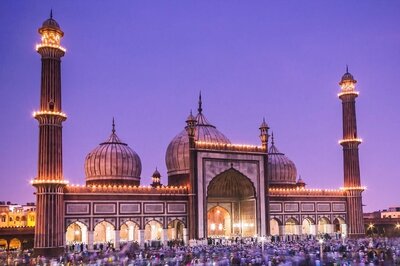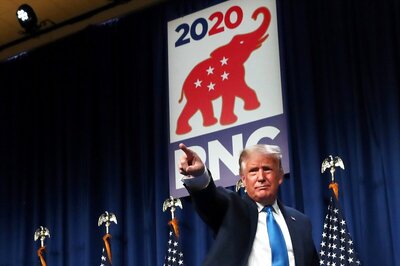
views
Pratibha Patil on Saturday became India's first woman President albeit after one of the most controversial Presidential elections in Indian history.
While the result was a foregone conclusion, it was the margin of victory that was truly impressive.
Patil defeated nearest rival – NDA-backed vice president Bhairon Singh Shekhawat – by more than three lakh votes.
The former governor of Rajasthan took an early lead when she bagged 223 votes in Andhra Pradesh - a considerable lead over Shekhawat who managed just two votes in the state. The value of one MLA's vote in Andhra Pradesh is 148.
After the results were announced, Patil described her victory as a ‘victory of principles and victory of right thinking’ by the people.
Patil, who had been haunted by unsubstantiated Opposition charges of corruption, fraud and improprieties, won almost 11,000 more votes than expected.
Shekhawat got 3,31,306 votes.
But while she may have started her campaign as an apparently clean candidate, Patil ended it as the most controversial one.
Therefore, it comes as no surprise that her ascent to Rashtrapati Bhavan has raised several questions - questions that could hold the key to the institution of the Presidency.
Also, comparisons are already being made between her and outgoing president A P J Abdul Kalam.
Will Patil be merely a rubber stamp or can she match the charisma of Kalam?
CNN-IBN’s special show Madam President, conducted by Editor-in-Chief Rajdeep Sardesai raised several pertinent questions about India’s new President and the institution of Presidency.
On the panel to discuss the issues were Congress leader Ashwani Kumar; Editor-In-Chief The Pioneer Chandan Mitra and Rajya Sabha MP,National Affairs Editor CNN-IBN Diptosh Majumdar; Telugu Desam Party president N Chandrababu Naidu and actress Pooja Bedi.
Who had the last laugh?
At the end of the campaign, does UPA really have reasons to celebrate? Isn’t Pratibha Patil stigmatised despite her victory?
Answering the question Kumar said, “Honestly speaking, it’s a moment for celebration. It is a defining moment for the democracy because it has elected women to the presidency. The nation knows that we have got more votes than numbers and that is a critical element. It is the beginning of the disintegration of the NDA.”
The NDA has got less votes than even it could have got with its numbers in the Assemblies and Parliament. Isn’t this a massive set back for the national democratic alliance?
“Sometimes the ‘winner takes all’ syndrome starts affecting everybody and when people see those numbers heavily stacked against them, its doesn’t make any difference. People may express some local grievances through by voting on other side, “ Mitra replied while talking about NDA’s defeat.
However, CNN-IBN’s National Affairs Editor Diptosh Majumdar described NDA’s defeat as a substantial setback. “There are voices of dissidents, which have been heard not just from Gujarat but also from Bihar and Chattisgarh. The UPA-Left-Mayawati combination that worked to maintain the coalition didn’t take substantial opinion which was building up against Pratibha Patil into account at all. “
The irony of the situation remains that while Patil’s victory is being seen as one bolstering Maharashtrian pride and upholding Maharashtrian Asmita, she didn’t go to Maharashtra even once during her campaign.
It appeared that the Congress was worried about sharing a platform with the Shiv Sena in Maharashtra that voted in favour of Patil.
Therefore, many believe there are various issues that make this somewhat not quite the victory that Congress is projecting.
Reacting to the statement Kumar said, “We can always find some kind of negative even in a moment of celebration. There is nothing of the sort. I know why she couldn’t go at the last moment. There were logistical problems. No question of her being hesitant to share the stage with anyone. The Shiv Sena has announced from day one that they will support a Maharashtrian.”
PAGE_BREAK
Is Pratibha Patil: The right choice?
For Pratibha Patil, it’s been a remarkable rise from a small town in Jalgaon to becoming the first citizen of the country.
She's the first woman President of India - a woman whose journey in politics spans more than four decades. Pratibha Patil has come a long way from the sleepy town of Jalgaon where she was born in 1934.
And now her controversial views on the veil and family planning have sent out a feeling that she is not the candidate for modern 21st century India.
But Congressman Kumar was clearly miffed by the statement and Patil should be given time as people “grow into Presidency”.
He said Patil was a candidate who has held several important posts both at states and national levels. “Give her the opportunity to show how well she will perform her Presidentship. I have absolutely no doubt that she would be able to reflect the aspiration of modern India, “he said.
Pitching up the UPA nominee, Kumar quoted William Haslet that the reputation of a man seldom in his own keeping.
He also argued that there existed no politician whose career had remained untouched by controversy.
But Chandan Mintra didn’t agree with Patil and said her track record didn’t speak in her favour. “I would love to be disproved but by judging her track record that seems a bit difficult. After so many years and with the whole baggage of controversies that are still their court case is still going on, I think it will be very difficult for her. She, rather than having to prove, will have to actually disprove the allegations and charges that are already exists against her and her family.”




















Comments
0 comment